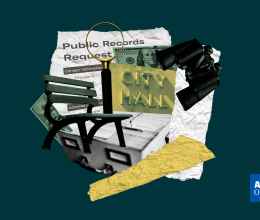In March 2019, House Bill 164 aka “The Ohio Student Religious Liberties Act,” was introduced. In November, it passed the Ohio House and is now on its way to the Senate.
Recently, HB 164 has received lots of statewide and national attention. This has led to some misconceptions about what this bill will accomplish and what it will not. Below, I hope to clear up any confusion about HB 164 as well as its impact and ramifications.
First, it is important to state the ACLU of Ohio is fully on board with protecting the religious liberties of our public school students. Such accommodations and protections are not only consistent with but are required by the First Amendment to the U.S. Constitution as well as the Ohio Constitution. The Bill of Rights applies to government entities, including our public schools.
Sometimes, this can put public schools in a bind. Government generally must remain neutral when it comes to religion, faith, religious practices, and related issues. That means, as the First Amendment states, government cannot advance or inhibit religion. On occasion, schools may overreact and violate a student’s rights as they attempt to remain neutral. Other times, schools may get it wrong when they allow too much accommodation and violate that neutrality requirement.
Many supporters see HB 164 as a way to inform and provide clarity in these matters. But in reality, HB 164 only sows further confusion and clarifies very little. Below are the ACLU of Ohio’s three primary concerns with HB 164 and why we oppose it, despite our support for student religious liberties in Ohio schools.
1) House Bill 164 is Entirely Unnecessary
As mentioned, the religious rights of Ohio’s public school students are already protected by the federal and state constitutions. For that simple reason, HB 164 is unneeded. The protections and provisions of the federal and state constitutions supersede state law.
However, in attempt to provide further assistance to all stakeholders (students, schools, teachers, Ohioans, you, and me), HB 164 essentially cuts and pastes various terms and principles from existing case law and court decisions into Ohio law under the belief such efforts help. They do not.
Constitutional language and principles were purposely left broad so later generations could decide for themselves how to apply them to their current society and lives. For example - sure, we have a right to free speech. But that does not mean any and all speech at any and all times. The same is true for guns, religion, privacy, our justice system, and other areas that have sorted out when unlimited constitutional rights end and some amount of regulation or restriction is permitted.
In other words, we wisely do not list in our laws every single way the free speech protections of the First Amendment apply to our art, speech, news media, and expression. We do not do that for any of our rights. Why should we do it now with students’ religious rights, via House Bill 164? Especially when case law can and does change the legal and societal landscapes. By enshrining the language of courts into our state law, we make it necessary, post-HB 164, for the legislature to pass another bill each and every time a new court decision comes out impacting Ohio students’ religious liberties. And I can promise you the Ohio legislature will not do that.
The end result of all this is more confusion, not less.
2) The “Coursework Provision”
The section on coursework and related assignments is the most debated part of HB 164. It has also been misinterpreted by some. Under current practices, students are graded using a variety of academic standards to ensure they are learning what schools and teachers expect them to digest and learn. On occasion, students will interject their religious beliefs into such assignments. There are times this may be irrelevant or unwelcome. There are other times the opposite may be true.
HB 164 tries to provide guidance in these situations by explaining teachers should still use “ordinary academic standards of substance and relevance, including any legitimate pedagogical concerns.” Would HB 164 stop there, there would be no problem. Instead, the bill continues “and shall not penalize or reward a student based on the religious content of a student’s work.” What exactly this vague, unhelpful language means is anybody’s guess – and that is precisely the problem. Does it mean, as some proponents claim, students should not be unfairly penalized if the inclusion of religious beliefs is part of their completion of an assignment but they still demonstrate the knowledge required or expected? Or, does it mean, for example, a student can complete a term paper on biological diversity over the course of history by providing answers reflecting their faith, no matter how irrelevant or scientifically incorrect? If so, HB 164 seeks to have it both ways; grade as you normally would but do not penalize for in any way for including religious beliefs.
Perhaps the former situation is the true intention of HB 164. If so, it should be clearly reflected in the language of the legislation because, right now, this section of HB 164 can be interpreted in a variety of ways. Such confusion does not help Ohio’s students or schools. It only makes these situations unnecessarily messy.
3) The Religious Speech Problems (the most troubling provision)
While the coursework language has received the most attention, it is not the most problematic part of HB 164. That belongs to the religious speech provision that directs schools to engage in unconstitutional practices. Indeed, HB 164 reads:
A student enrolled in a public school may engage in religious expression before, during, and after
school hours in the same manner and to the same extent that a student is permitted to engage in
secular activities or expression before, during, and after school hours.
It is understandable this may sound to some like simply ensuring schools do not discriminate against religious speech. The reality is far more troubling.
Consider this example: A student club devoted to suicide prevention approaches the principal asking to use the school gymnasium next Tuesday at 2pm so their members can discuss this issue with their fellow classmates. At that assembly, they will talk about mental health, stress, and available resources.
Under HB 164, that same principal is required to allow a student religious club to have its own assembly, on the same topic, where their message can simply be the only correct answer for suicide prevention is to get right with God and religion. It need not even be another club making the request. It could simply be one student. Their own assembly need not even be about suicide. Under HB 164, it presumably could be about any topic, as long as it is religious in nature.
Perhaps a school allows students to use the public address system to make announcements. For example – the chess club will meet at 3pm today in Room 100, there will be a pep rally for the football team on Friday, and we need more volunteers to decorate for the homecoming dance. Under HB 164, the school must allow students to deliver religious messages – or even prayers – over that same PA system.
Indeed, such a broad, almost unlimited provision can and will include everything from yearbooks to school plays, the student newspaper, sporting events, and everything else. After all, under HB 164, such religious speech and expression must be accommodated “in the same manner and to the same extent” as non-religious speech of each and every kind. All while the public school also attempts to remain or appear neutral, as they are required. Much luck to them as they attempt to navigate this constitutional minefield.
Student religious liberties is an important issue that should be treated seriously. But, House Bill 164 is not needed. It does not accomplish what supporters say it will and actually moves Ohio the opposite direction. Schools will be sued. While we appreciate the concerns of HB 164 proponents, this bill does far more harm than good and that is why the ACLU of Ohio will continue to oppose it.







